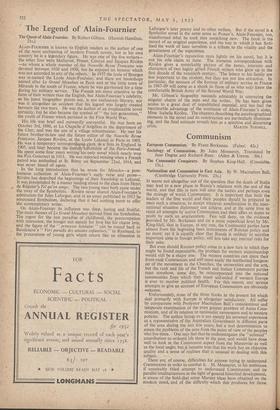The Legend of Alain-Fournier
The Quest of Alain-Fournier. By Robert Gibson. (Hamish Hamilton. 21s.) ALAIN-FOURNIER is known to English readers as the author of one of the most enchanting of modern French novels, but in his own country he is a legendary figure. He was one of the five writers— the other four were Mallarme, Proust, Conrad and Jacques Rival.° —to whom a whole number of the Nouvelle Revue-Francaise was devoted between 1920 and 1930, but he enjoyed an honour which was not accorded to any of the others. In 1937 the lycee of Bourges was re-named the Lycee Alain-Fournier, and there are bookshops named after Le Grand Meaulnes in pans and at 'the little town of Mirande in the south of France, where he was garrisoned for a time during his military service. The French are. more attentive to the fame of their writers than the English, but Alain-Fournier's celebrity, as his latest biographer points out, is not exclusively literary, nor was it altogether an accident that his legend was largely created between the two wars. He was the author of an irreplaceable novel certainly, but he also became the symbol of " the lost generation," the youth of France which perished in the First World War.
His life was brief and outwardly uneventful. He was born on October 3rd, 1886, at La Chapelle d'Angillon in the department of the Cher, and was the son of a village schoolmaster. He met his future brother-in-law and the future editor of the Nouvelle Revue Francaise, Jacques Riviere, at the Lycee Lakanal in Paris in 1903. He was a temporary correspondence clerk in- a firm in England in . 1905, and later became the literary columnist of the Paris-Journal. He spent some four years writing his only novel which nearly won the Prix Goncourt in 1913, He was reported missing when a French patrol was ambushed at St. Remy on September 22nd, 1914, and was never heard of again.
In the long introduction that he wrote for Miracles—a post- humous collection of Alain-Fournier's early verse and prose- Riviere has described the beginnings of their friendship at Lakanal. It was precipitated by a master reading aloud to the class from Henri de Regnier's Tel qu'en songe. The two young men both came under the sway of the Symbolists. Riviere never shared Alain-Foumier:s admiration for Jules Laforgue, and in an essay published in 1913 he renounced Symbolism, declaring that it had nothing more to offer the contemporary writer.
On Alain-Fournier its influence was deep, lasting and fruitful. The main themes of Le Grand Meaulnes derived from the Symbolists. The regret for the lost paradise of childhood, the preoccupation with innocence, the hunger not merely for love but for chaste love, and the figure of the " princesse Thiamine " can be traced back to Baudelaire's " Vert paradls des amours enfantines," to Rimbaud, to the processions of young girls which return like an obsession in Lafoigue's later poetry and to other writers. But if the novel is a Symbolist novel in the same sense as Proust's, Alain-Fournier, too, transformed what he took into something new. The book is the record of an original experience, and the way in which it has ferti- lised the work of later novelists is a tribute to the vitality and the genuineness of the experience.
Alain-Fournier's reputation rests lightly on his novel, but it is not his sole claim to fame. The immense correspondence with Riviere gives a remarkable picture of the tastes, interests and characters of two highly gifted French writers who grew up in the first decade of the twentieth century. ' The letters to his family are less important to the student, but they are not less_ attractive. In particular, the account of the horrors of military service in France in 1907-09 will come as a shock to those of us who only knew the comfortable British Army of the Second World War.
Mr. Gibson's biography succeeds admirably in conveying the singular charm of the man and the . writer. He has been given access to a great deal Of unpublished material, and has had the inestimable advantage of the assistance of Alain-Fournier's sister, Mme Isabelle Riviere. The chapters describing the autobiographical elements in the novel and its construction are particularly illuminat- ing, and the final estimate reveals him as a sensitive and discerning


































 Previous page
Previous page